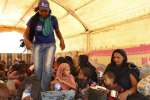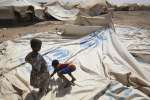- Text size
 |
|  |
|  |
| 
- Français
UNHCR reinforces assistance to refugee hosting countries, ahead of Mali elections
Briefing Notes, 28 June 2013
This is a summary of what was said by UNHCR spokesperson Adrian Edwards – to whom quoted text may be attributed – at the press briefing, on 28 June 2013, at the Palais des Nations in Geneva.
With a month to go before the 28 July presidential elections in Mali UNHCR is strengthening its role in helping neighbouring countries deal with out-of-country voting for Malian refugees.
Burkina Faso, Niger and Mauritania together host 175,000 Malian refugees from the recent conflict there. Refugees eligible to vote in exile are people already registered in the Malian Administrative Civil Status Census done in 2010.
UNHCR is supporting the participation of refugees in these elections, although our role is limited to a strictly humanitarian and non-political one. We are providing refugees with practical information on their right to participate in the elections and we are also providing some transportation.
In Burkina Faso, we have undertaken awareness campaigns in all refugee camps (Goudoubo, Mentao and Sag-nioniogo), as well as spontaneous refugee sites (Dibissi, Tin Hedja, Deou and Gountouré Gnégné) and in urban settings with concentration of refugees (Bobo-Dioulasso, Ouagadougo and Ouahigouya).
Voting will be on a voluntary basis and refugees are being informed accordingly. We are letting people know that personal information and data held by UNHCR is not being shared with the Malian government, and advising on steps to take should people come under pressure from any person or party involved in the election.
Between last Tuesday (25 June) and today, and with UNHCR logistics, transportation, and translation support, ten Malian teams deployed by the Malian Embassy have started registering refugees for the vote. Of 49,945 refugees in camps and spontaneous sites, 18,409 are of voting age (age 18 and above). The registration process is being monitored by Burkina Faso's national refugee commission CONAREF (Commission nationale pour les refugies). Participation of refugees in registration was low at first but has since picked up. Registration figures should be available in the next days. The names of those who registered will be transmitted to the Bamako authorities so that their electoral cards can be sent to Burkina Faso and then distributed to the refugees.
Similar arrangements are in place in Niger and Mauritania.
In Niger, which is hosting some 50,000 Malian refugees, teams from the Malian Consulate have registered voters in the Mangaize and Tabareybarey camps. The exercise is continuing in the Abala camp, as well as in the Intekan and Tassalit refugee hosting areas (in the Tahoua region), with UNHCR logistics support.
In Mauritania, which hosts 75,000 Malian refugees in Mbera camp, preparations for the registration of Malian voters are on-going. Consultations between the Mauritanian authorities, the Malian embassy in Nouakchott and UNHCR are continuing. UNHCR is providing logistics support.
UNHCR has previously facilitated out-of-country voting by refugees in South Sudan in 2011, in Iraq in 2010 and in Afghanistan in 2004.
For more information on this topic, please contact:
- In Dakar: Helene Caux (Regional) on mobile + 221 77 333 1291
- In Burkina Faso: Hugo Reichenberger on mobile + 226 65 50 47 86
- In Niger: Charlotte Arnaud on mobile + 227 92 19 19 03
- In Mauritania: Dalia Al Achi (regional, Tunis) on mobile + 216 58 33 51 18
- In Geneva: Fatoumata Lejeune-Kaba on mobile +41 79 249 34 83



















































